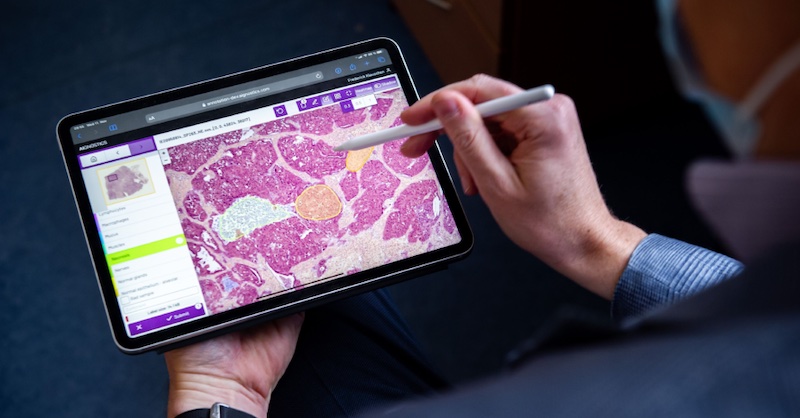
Aignostics is a Germany-based company that specializes in AI-powered pathology. It recently closed a $14 million Series A round led by Wellington Partners, a German venture capital firm that has also invested in another unique European health tech company: Sidekick Health. Additionally, BIVF’s VC fund, Fonds Technologie des Venture Funds of IBB Ventures, High-Tech Grunders and Ascension contributed to the round.
It’s difficult to identify characteristics and biomarkers through large sets of samples. This is because individual pathologists have exceptional skill in analyzing single samples, but this becomes tedious when dealing with many samples. Consequently, this has led to a lack of effective identification in large sample sets.
Aignostics recently collected almost $20 million in funding. They plan to further develop their AI models, grow their company’s reach in Europe and the US.
A Foundation In Academic Research
Aignostics co-founder and senior pathologist Frederick Klauschen spent most of his work day looking through a microscope. Matyas explained that this sparked Klauschen to question if this method was the most efficient. Matyas continued by saying that Klauschen began to explore alternative methods for analyzing biopsies and other medical samples. Ten years ago, he started Aignostics with his ideas and vision for the company.
Aignostics was founded in 2020 as a result of Matyas’ collaboration with Klaus-Robert Muller of Technical University Berlin. Dr. Max Albert, the fourth co-founder and chief technology officer, joined the company in 2018. Aignostics started in the Charite – Universitatsmedizin Berlin accelerator program.
Aignostics’ key advantages over other companies in the same field come from their background. Their ties to the research community and easy access to data make it easier for them to build custom AI models. Lead investor Dr. Johannes Fischer commented on Aignostics’ advantage. He said, “what makes Aignostics unique is not just their technology, but also the fact that key pathologists are always involved in the development process.” Dr. Fischer continued, stating that Aignostics’ advantage comes from its ability to quickly create AI models that are ready to be implemented by its clients on their specific data sets.
A Different Approach To AI
Some believe that medical AI has a bad reputation due to diagnoses made without taking into account medical information. However, Aignostics have patented an answer to this problem. Their solution is an ‘explainable AI’ model that reverse engineers their models and highlights what they are based on. Additionally, they have created a model that does not require pathologist annotations— allowing the model to learn only from the samples given to it.
Matyas explains that tissue samples examined under a microscope are difficult to analyze. In order to examine a small part of the sample, researchers have to zoom in incredibly far. Consequently, they might only be looking at 1% of the actual sample. Because of this, advancing pathology poses a challenge. However, Matyas’ new method promises a breakthrough by changing the way that approach is seen. There are thousands of clinical trials occurring at any given time. Each one has to rely on estimates and qualitative observations. This means that many helpful insights might go unnoticed, and important diagnostic and therapeutic information may not be seen. Until now, this was the only way to conduct these trials.
Growing The Market
The company has 55 employees and additional 20 pathologists collaborating with them. They’re based in Berlin and most of their clients are from Europe. However, they plan to expand into the US market.
Matyas explained that the company is looking beyond research-based projects. They want to prepare their platform for prospective clinical trials, and have hired a Chief Business Officer based in Boston to help. Additionally, they want to focus more on the US market. Using data from the past, we currently complete all activities. The plan is to use these models in future clinical routines.
Aignostics is currently working on developing their platform to take part in clinical trials. Matyas says, “As a first step, we want to run these models in early-stage clinical trials.” By becoming a leader in the market, they hope to create companion and complementary diagnostics. At the time of the interview, no AI-based tissue companion diagnostics had been released.
Better Treatment Through AI
Matyas says there are two approaches to AI in medicine. Some companies focus on specific samples — like Aignostics — assisting or even replacing pathologists. Others like Matyas’ company focus on larger-scale research and clinical trials, like the development of new pharmaceuticals. He personally prefers this approach because he believes it can offer more long-term benefits for patients.
Matyas believes it won’t be long until AI appears in medical clinics. However, how long this takes depends on AI regulatory approval. Regardless, Matyas is certain that AI will be here to stay in both clinical and research applications. Matyas believes that in a few years, no clinical trial will take place without at least being assessed by AI. This is because AI will have the potential to speed up and improve the accuracy of research.


